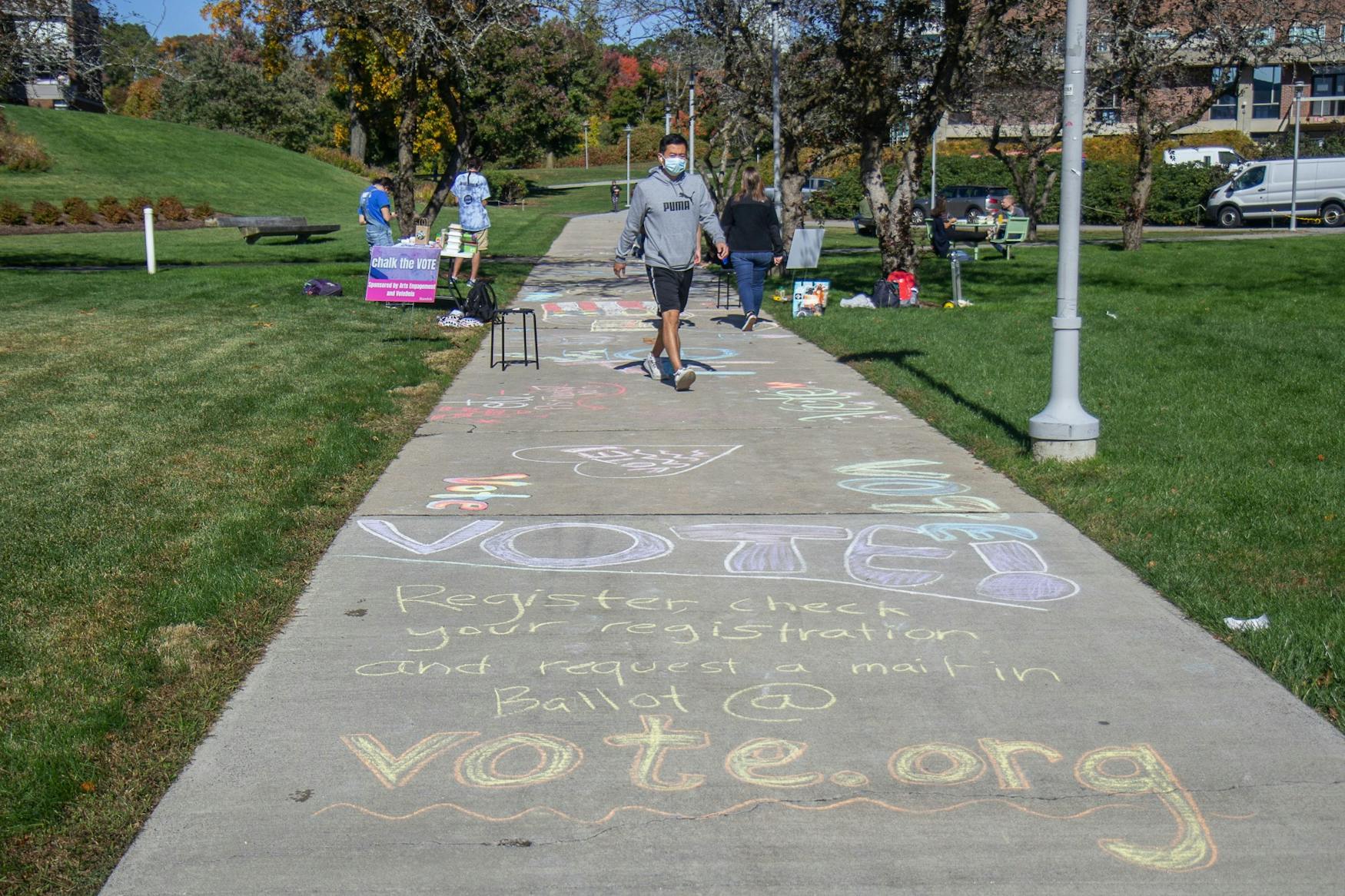Creators of VoteDeis discuss the formation of the coalition
Leigh Swigart and David Weinstein shared the process and goals behind the VoteDeis coalition.
Director of Programs in International Justice and Society at the Ethics Center Leigh Swigart and Assistant Director of ENACT and Communications for the Ethics Center David Weinstein spoke with the Justice on Oct. 16 about their role in the formation of the VoteDeis coalition, a nonpartisan campus initiative dedicated to ensuring all eligible students are registered and have a plan to vote.
While Provost Lisa Lynch unveiled the VoteDeis website to the community on Sept. 10, the coalition had been developing much longer, Swigart and Weinstein said. Members of the Ethics Center were looking to expand the work of the Educational Network for Active Civic Transformation and to focus on voter registration and turnout in light of the 2020 presidential election. ENACT is a national program through the Ethics Center that engages undergraduate students in state-level politics. Starting in November, Swigart and Weinstein, along with ENACT Student Delegate Zosia Busé ’20, represented the University at meetings of Boston Votes, a nonpartisan network of students and administrators in the greater Boston area which works with 25 colleges and universities to encourage student voting.
In January, Swigart and Weinstein convened a meeting of people who were already involved in political engagement work on campus, and “it became clear that there were lots and lots of really fantastic efforts going on, but they were really disparate, and they were not coordinated,” Swigart said. At this time, Swigart said, they realized that VoteDeis could “coordinate and … act as a clearing house of information and event planning and … publicity.”
The coalition hosted a couple of in-person events early in the year before transitioning to online organizing. On March 9 and 10, just before campus closed due to the pandemic, the Ethics Center hosted two panels on political engagement: Voting and Democracy in 2020 and Beyond with Boston City Councilor Lydia Edwards and Massachusetts State Sen. Becca Rausch ’01, and Young Political Leadership – An ENACT Forum with state representatives from Massachusetts, Maine and Connecticut.
As the coalition grew, Swigart and Weinstein continued to learn about people who were doing similar work on campus or were interested in getting involved. As examples of people already involved in such efforts, Weinstein mentioned the University’s Government Information Librarian Aimee Slater, who had already compiled a comprehensive libguide for voting resources, and Director of Arts Engagement Ingrid Schorr, a coalition member who approached the issue from an arts perspective. “We tried to … get a handle on what was already happening on campus, and then invite people who were involved with that to come together” to coordinate efforts and share resources, Weinstein said.
Aside from the voting resources compiled on their website, VoteDeis is working to “promote engagement with elections,” Weinstein said, through events like debate watch parties, both in-person and virtual. More watch parties are scheduled for upcoming debates in the next several weeks. Looking to the future, Weinstein predicted involvement with state and local elections, as well as conversations about democracy in other countries.
Swigart emphasized the importance of President Ron Liebowitz’s support of the coalition’s efforts. Liebowitz signed the Higher Education Presidents’ Commitment to Full Student Voter Participation, a part of the ALL IN Democracy Challenge, and also participated in a “Why I Vote” video testimonial for VoteDeis. Weinstein noted that the Dean of Students Office has also provided essential support in maintaining the VoteDeis website, spreading the word through their newsletters and other outlets and helping organize events.
For those who are unsure whether they want to vote, Swigart pointed to the “Why I Vote” videos as an antidote to disillusionment. Weinstein agreed, saying that many “Why I Vote” speakers “don’t take [the right to vote] for granted because … many people historically have not had that right. … Even now access to that right is not universal,” he said. “Don’t throw away something that is so precious,” he added. Weinstein also rejected the belief that one’s vote doesn’t really count. “When it comes down to it, small numbers of votes … have a large impact,” Weinstein said, especially at the state and local levels, but on the national level as well. Individual votes can also be particularly effective on ballot measures, judges and governors, he said.
Swigart expressed frustration with the “piecemeal approach” to voting policies from state to state, which can be confusing and variable, and wished that there was a universal federal voting policy. Weinstein emphasized that the sheer mass of information can be overwhelming, especially for young people who may be voting or engaging in politics for the first time. In addition to the resources compiled on the VoteDeis website, Weinstein shared that students can write to votedeis@brandeis.edu with questions and concerns, and to express interest in getting involved with the coalition.




Please note All comments are eligible for publication in The Justice.